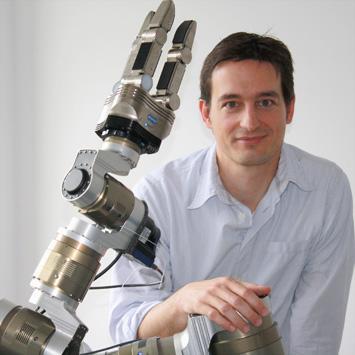event
IRIM Robotics Seminar–Marc Toussaint
Primary tabs
University of Stuttgart’s Marc Toussaint presents “From (Inverse) Optimal Control to Joint (Cooperative) Sequential Manipulation and Motion Planning” as part of the IRIM Robotics Seminar Series. The event will be held in the GTMI Auditorium from 12-1 p.m. and is open to the public.
Abstract
With this talk my aim is to give a more integrated view on my research. I will start with the planning-as-inference framework and its implications in the context of stochastic optimal control. While this, in principle, allows us to exploit any probabilistic inference method, in concrete robotics applications I typically use the Laplace approximation, which leads back to a path optimization problem. I will discuss efficient, 2nd-order constraint path optimization methods that exploit the problem structure and our work on inverse optimal control based on this framework. Switching to higher-level reasoning, I will then briefly discuss our work on learning and planning in relational Markov decision processes—the core open problem for applying this in real-world robotics clearly is the symbol grounding or acquisition problem. Our recent work on logic-geometric programming, which proposes a joint-path optimization and task planning formulation, combines a first-order symbolic description of the kinematic structure of sequential manipulation into the mathematical program over a path. This joint formulation of symbolic decision and path optimization problems also guides our recent work on human-robot cooperative manipulation. Throughout the talk I will mention more applications we work on, including exploring the environment to find manipulable degrees of freedom, manipulation skill learning, manipulation POMDPs, inverse optimal control, and cooperative assembly of IKEA items.
Bio
Marc Toussaint has been a professor of machine learning and robotics at the University of Stuttgart since 2012. Previously, he was an assistant professor at the Free University Berlin, leading an Emmy Noether research group at TU Berlin, and also spent two years as a post-doc at the University of Edinburgh. Toussaint’s research focuses on the combination of decision theory and machine learning, motivated by fundamental research questions in robotics. Reoccurring themes in his research are appropriate representations (symbols, temporal abstractions, relational representations) to enable efficient learning and manipulation in real-world environments, and how to achieve jointly geometric, logic, and probabilistic learning and reasoning. Currently, Toussaint is the coordinator of the German research priority programme on Autonomous Learning, a member of the editorial board of the Journal of AI Research (JAIR), a reviewer for the German Research Foundation, and a programme committee member of several top conferences in the field (UAI, R:SS, ICRA, IROS, AIStats, ICML). His received a best paper award at R:SS ’12 and ICMLA ’07 and was a runner-up at UAI ’08.
Status
- Workflow status: Published
- Created by: Josie Giles
- Created: 01/07/2016
- Modified By: Fletcher Moore
- Modified: 04/13/2017
Categories
Keywords
User Data
Target Audience

